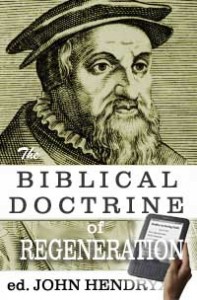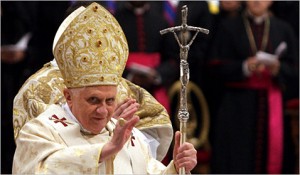 I am humbled to have contributed a chapter to this new e-book – there’s some outstanding essays from some of the great teachers of the Church in history on a very misunderstood topic: here.
I am humbled to have contributed a chapter to this new e-book – there’s some outstanding essays from some of the great teachers of the Church in history on a very misunderstood topic: here.
Monthly Archives: February 2013
The Greatest Heresy?
 Dr. Sinclair Ferguson, wrote this brief article “What is the Greatest of All Protestant “Heresies”?” in Tabletalk magazine:
Dr. Sinclair Ferguson, wrote this brief article “What is the Greatest of All Protestant “Heresies”?” in Tabletalk magazine:
Let us begin with a church history exam question. Cardinal Robert Bellarmine (1542–1621) was a figure not to be taken lightly. He was Pope Clement VIII’s personal theologian and one of the most able figures in the Counter-Reformation movement within sixteenth-century Roman Catholicism. On one occasion, he wrote: “The greatest of all Protestant heresies is _______ .” Complete, explain, and discuss Bellarmine’s statement.
How would you answer? What is the greatest of all Protestant heresies? Perhaps justification by faith? Perhaps Scripture alone, or one of the other Reformation watchwords?
Those answers make logical sense. But none of them completes Bellarmine’s sentence. What he wrote was: “The greatest of all Protestant heresies is assurance.”
A moment’s reflection explains why. If justification is not by faith alone, in Christ alone, by grace alone — if faith needs to be completed by works; if Christ’s work is somehow repeated; if grace is not free and sovereign, then something always needs to be done, to be “added” for final justification to be ours. That is exactly the problem. If final justification is dependent on something we have to complete it is not possible to enjoy assurance of salvation. For then, theologically, final justification is contingent and uncertain, and it is impossible for anyone (apart from special revelation, Rome conceded) to be sure of salvation. But if Christ has done everything, if justification is by grace, without contributory works; it is received by faith’s empty hands — then assurance, even “full assurance” is possible for every believer.
No wonder Bellarmine thought full, free, unfettered grace was dangerous! No wonder the Reformers loved the letter to the Hebrews!
This is why, as the author of Hebrews pauses for breath at the climax of his exposition of Christ’s work (Heb. 10:18), he continues his argument with a Paul-like “therefore” (Heb. 10:19). He then urges us to “draw near … in full assurance of faith” (Heb. 10:22). We do not need to re-read the whole letter to see the logical power of his “therefore.” Christ is our High Priest; our hearts have been sprinkled clean from an evil conscience just as our bodies have been washed with pure water (v.22).
Christ has once-for-all become the sacrifice for our sins, and has been raised and vindicated in the power of an indestructible life as our representative priest. By faith in Him, we are as righteous before the throne of God as He is righteous. For we are justified in His righteousness, His justification alone is ours! And we can no more lose this justification than He can fall from heaven. Thus our justification does not need to be completed any more than does Christ’s!
With this in view, the author says, “by one offering He has perfected for all time those who come to God by him” (Heb. 10:14). The reason we can stand before God in full assurance is because we now experience our “hearts sprinkled clean from an evil conscience and … bodies washed with pure water” (Heb. 10:22).
“Ah,” retorted Cardinal Bellarmine’s Rome, “teach this and those who believe it will live in license and antinomianism.” But listen instead to the logic of Hebrews. Enjoying this assurance leads to four things: First, an unwavering faithfulness to our confession of faith in Jesus Christ alone as our hope (v.23); second, a careful consideration of how we can encourage each other to “love and good works” (v.24); third, an ongoing communion with other Christians in worship and every aspect of our fellowship (v.25a); fourth, a life in which we exhort one another to keep looking to Christ and to be faithful to him, as the time of his return draws ever nearer (25b).
It is the good tree that produces good fruit, not the other way round. We are not saved by works; we are saved for works. In fact we are God’s workmanship at work (Eph. 2:9–10)! Thus, rather than lead to a life of moral and spiritual indifference, the once-for-all work of Jesus Christ and the full-assurance faith it produces, provides believers with the most powerful impetus to live for God’s glory and pleasure. Furthermore, this full assurance is rooted in the fact that God Himself has done all this for us. He has revealed His heart to us in Christ. The Father does not require the death of Christ to persuade Him to love us. Christ died because the Father loves us (John 3:16). He does not lurk behind His Son with sinister intent wishing He could do us ill — were it not for the sacrifice his Son had made! No, a thousand times no! — the Father Himself loves us in the love of the Son and the love of the Spirit.
Those who enjoy such assurance do not go to the saints or to Mary. Those who look only to Jesus need look nowhere else. In Him we enjoy full assurance of salvation. The greatest of all heresies? If heresy, let me enjoy this most blessed of “heresies”! For it is God’s own truth and grace!
 I would just add my own short comment here by asking this question: What prompted John to write his First Epistle? What was the motivation in John’s heart and mind?
I would just add my own short comment here by asking this question: What prompted John to write his First Epistle? What was the motivation in John’s heart and mind?
We don’t have to speculate – he tells us:
“I write these things to you who believe in the name of the Son of God that you may know that you have eternal life.” – 1 John 5:13
John wrote his first epistle with this purpose in mind – that all who have faith in the Lord Jesus Christ would be fully assured of their salvation.
The Pope Resigning This Month
 With the breaking news of the Pope resigning this month (the first time a Pope has done so in 598 years) the world is going to be filled with Roman Catholic propaganda over the next 6 weeks or so… its put the issue of the Papacy right back center stage. In the midst of all the media hoopla and rhetoric which is sure to occur, Dr. James White, some years back):
With the breaking news of the Pope resigning this month (the first time a Pope has done so in 598 years) the world is going to be filled with Roman Catholic propaganda over the next 6 weeks or so… its put the issue of the Papacy right back center stage. In the midst of all the media hoopla and rhetoric which is sure to occur, Dr. James White, some years back):
“We all heard the ‘2,000 years of Jesus’ Catholic Church’ mantra last year when John Paul II died, and it was almost never challenged. I would ask our writer to name, please, a single bishop at the Council of Nicea who believed as he believes on each of these topics: Marian dogmas (Perpetual Virginity, Immaculate Conception, Bodily Assumption), Papal Authority (infallibility), Purgatory, transubstantiation. Any semi-serious reader of history knows he would not be able to find such a person, so the claim of ‘2,000 years’ may sound impressive, but it has the truth value any advertising slogan carries: none. It may sound great to those ignorant of history, and to those who wear the glasses Rome provides that filters out all the extraneous problems and issues, but for anyone with an even semi-decent grasp of the past, it is a hollow, shallow claim.”See More
